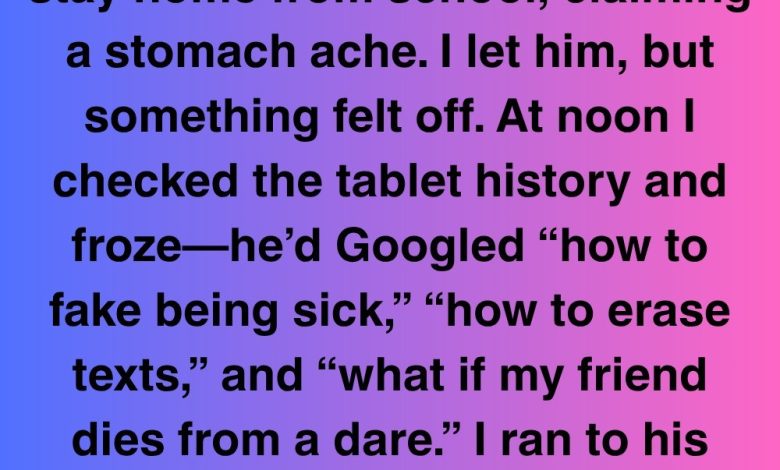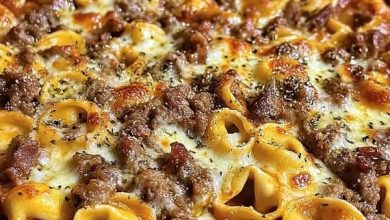
What I Found On His Tablet Changed Everything
My twelve-year-old begged to stay home from school, claiming a stomach ache. I let him, but something felt off. At noon I checked the tablet history and froze—he’d Googled “how to fake being sick,” “how to erase texts,” and “what if my friend dies from a dare.” I ran to his room and found him curled under the blanket, pretending to sleep.
My heart thudded as I sat beside him. His eyes were shut tight, but his breathing was too shallow, like someone faking sleep. I gently shook his shoulder. “Hey, bud. You okay?” He didn’t answer, just mumbled something about his stomach.
I told myself to stay calm. I didn’t want to scare him off or make him shut down. “I saw what you were looking up,” I said quietly. His eyes flew open, and in that moment, he looked so small. Not twelve. Just a scared little boy.
He sat up slowly, lips trembling. “I didn’t mean for it to happen. I swear.” That’s when my chest tightened for real. I didn’t even know what “it” was yet, but I knew something was seriously wrong.
I took a breath and kept my voice steady. “Start from the beginning. What’s going on?”
He stared down at his hands, picking at a loose thread on his pajama pants. “It was just a dare. Stupid, stupid dare. Me and Riley dared Gavin to ride his bike down those big steps behind the community center. He said no at first, but then we kinda teased him. Said he was scared.”
I closed my eyes briefly. Those steps were steep concrete, uneven and cracked. My stomach turned imagining a kid on a bike barreling down them.
“He did it,” my son whispered. “He did it and flew off the second step. Landed weird. He hit his head.”
I asked, “Is he in the hospital?” but my son just looked at me with wet eyes. “I don’t know,” he whispered. “He wasn’t moving much. We panicked. Riley said not to tell anyone or we’d get in huge trouble.”
I tried to keep from shaking. “When did this happen?”
“Yesterday after school. We left him there for a minute, but then he sat up, kinda. Riley said he’d take him home on his bike and tell his mom he fell.”
That didn’t sit right with me. “Did Gavin make it home?”
He shrugged, voice cracking. “I don’t know. I texted Riley this morning. He didn’t answer. That’s why I stayed home. I don’t know if he’s okay.”
I reached for my phone and called Gavin’s mom. I didn’t know her well—just the occasional PTA nod or carpool wave. She didn’t pick up. I tried again. Voicemail.
I stood. “Get dressed. We’re going over there.”
He looked up, panicked. “Am I gonna get arrested?”
I knelt again. “I don’t know what’s going to happen, but I do know this—we don’t run from things. We make them right. Even when it’s scary.”
Ten minutes later, we were in the car, silence thick between us. As we pulled up to Gavin’s apartment building, I saw an ambulance out front. My foot hit the brake so hard I jerked us forward.
We ran. Gavin’s mom was on the sidewalk, pacing, eyes red. She saw me and just burst into sobs. I put my arms around her before I even thought to ask what happened.
“He was acting weird all night,” she choked. “Said he fell. Said he was fine. Then this morning he collapsed in the bathroom.”
I felt like my legs might give out. She went with the EMTs, and my son and I just stood there. We drove home in silence again, both of us shell-shocked.
That night, Riley’s mom called. I braced myself. But what she said surprised me.
“I just want you to know,” she began, “Riley told me everything. He said your son tried to call me after the fall, but Riley told him not to. He’s feeling horrible. We’re going to the hospital to check on Gavin.”
I sat down on the edge of the couch. “Your son said mine tried to help?”
She sighed. “He wanted to call 911. Riley threatened to tell everyone he was a snitch if he did. I’m sorry.”
Later that evening, we got a call from the hospital. Gavin had a concussion and a fractured wrist, but he was stable. He’d need monitoring, but the doctors said he’d be okay.
I let out a shaky breath and turned to my son, who had been hovering by the hallway.
“He’s going to be alright,” I told him. He started crying and didn’t stop for a full five minutes.
The next day, I took him to visit Gavin. We brought a card and some snacks. Gavin smiled weakly and didn’t seem angry. He just looked tired. He said he barely remembered the fall, but he did remember my son trying to help.
“I heard you yelling at Riley,” Gavin mumbled. “You said it wasn’t funny anymore.”
That night, after the visit, my son asked me something unexpected.
“Can I talk to Principal Harris tomorrow? I wanna tell her what happened.”
I blinked. “Are you sure?”
He nodded. “It’s not right. And I don’t want Riley to scare anyone else into being quiet again.”
It was a brave move. I was proud of him. But I knew it wouldn’t be easy.
At school, he gave a full statement. So did Riley, eventually. Turns out, this wasn’t the first time Riley had dared someone into doing something risky. There’d been incidents on the playground, even at the local skate park. But no one ever spoke up.
That changed now.
The school called a special assembly. The principal didn’t name names but addressed the entire student body about peer pressure, responsibility, and how silence can hurt people. They even brought in a counselor to speak.
The surprising part? Riley started going to those counseling sessions. At first, his mom dragged him, but later he started going on his own. She said it was the first time he’d shown signs of remorse.
As for Gavin, he healed well. He had to wear a brace and stay off sports for a few months, but he bounced back. His mom thanked us for being honest, even when it was messy.
My son changed too. Slowly but surely.
He joined a student group at school focused on building positive friendships and preventing bullying. He gave a short speech one day that made me cry in the back row. He said, “Sometimes being a good friend means standing up to your own friends. Even if they hate you for it. But if I could go back, I’d speak up sooner. Every time.”
The kids clapped. Some parents did too.
I won’t pretend everything was sunshine after that. He still had hard days. So did I. There were times I caught him zoning out, guilt heavy on his shoulders.
But we talked through it. Always.
One evening, months later, we were at the grocery store. A woman tapped me on the shoulder. It was Gavin’s grandmother. I hadn’t met her before.
“I just wanted to say thank you,” she said softly. “For raising a boy who knew when to stop pretending and start doing the right thing.”
I swallowed hard and smiled. “Honestly, he’s the one teaching me now.”
That night, I thought about the Google searches. “How to fake being sick,” “how to erase texts,” “what if my friend dies from a dare.” Those words haunted me at first.
But now? Now they remind me that sometimes kids look for answers in the wrong places because they’re scared. What matters is what they do when the truth finally stares them in the face.
My son didn’t run. He didn’t bury it. He owned up to what happened, even though he knew it could mean punishment, shame, or losing friends.
That’s courage.
And the truth is, sometimes we adults don’t even do that. We hide. We deflect. We try to protect our pride.
But that twelve-year-old boy? He stood up.
I’ve learned not to panic the moment something seems off. But I’ve also learned not to ignore that gut feeling. It was what pushed me to check his tablet. What drove me to make the calls. What got us to Gavin in time.
Parenting doesn’t come with a rulebook. It’s a million tiny guesses, late-night worries, and hoping you’re doing enough. But if there’s one thing I now believe, it’s this:
The goal isn’t to raise perfect kids.
It’s to raise kids who know how to make things right when they mess up.
That’s the kind of person who changes lives.
If this story resonated with you, give it a like or share it with someone who might need to hear it. You never know who might be searching for answers—or the courage to speak up.




